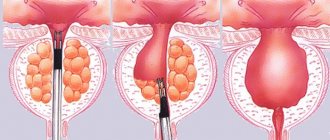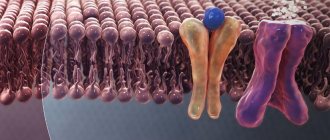Physiology of urine output
Urination is necessary to remove unnecessary metabolic products and harmful chemical compounds from the body.
Urine itself is formed in the kidney tissue as a result of blood filtration: nephrons successively remove ballast substances from the blood vessels and return necessary components, such as proteins and salts, to the bloodstream. More than one hundred liters of primary urine can be formed per day, but as a result of final filtration, 800-1500 milliliters of liquid per day are removed from the body. The excretory fluid formed in the kidneys penetrates into other parts of the excretory system for accumulation and gradual removal from the body. Approximately 500 ml of urine can be deposited in the bladder, and a person begins to feel the need to urinate when a quarter of the organ’s volume is filled. The signal received from the brain relaxes the sphincter and promotes the removal of fluid from the body through the urethra. In men, part of the urethra passes through the prostate gland, so prostate pathologies can cause dysuria.
Causes of the symptom
As already mentioned, the most common cause of itching during urination is infection. Pathogenic microorganisms penetrate the mucous membranes and cause an inflammatory process. Increased pain during urine output can be explained by the effect of the liquid on the receptors of inflamed tissues. At the same time, often unpleasant sensations do not go away after urination and torment a person for a long time.
Possible causes of dysuria:
- Urolithiasis, characterized by the formation of stones in the bladder or urethra. Hard structures irritate the mucous membrane of organs during the movement of urine and cause inflammation. A common sign of this disease is the appearance of blood in the urine.
- Kidney stones are the formation of stones in the kidneys. Stones from the kidney tissue can also travel to the underlying parts of the excretory system and cause blockage of the tract.
- Infectious or non-infectious inflammation of the bladder (cystitis).
- An abnormal narrowing of the urethra, making it difficult for urine to flow.
- Sexually transmitted diseases affecting the urogenital tract.
- Inflammation of the prostate gland in men, manifested by tissue swelling and compression of the urethra.
- Oncological diseases. Dysuria occurs with the growth of malignant neoplasms of the prostate and bladder.
- Inflammation of the kidney tubules due to a bacterial or viral infection (pyelonephritis).
- Gynecological diseases in women. First of all, this is vaginitis, in which inflammation can spread to the tissue of the urethra.
If the doctor's examination fails to detect the specific disease causing the pain, additional factors are considered. Dysuria often occurs due to poor nutrition or other features of a person’s lifestyle.
Why does a burning sensation occur after urination in men?
In men, the length of the urethra is much longer than in women, so bacterial inflammation occurs less frequently in them, and among the main causes, in addition to sexually transmitted infections, the following can be identified:
- The consequences of inflammation of the urethra are urethritis.
- Urolithiasis, when sediments of urine, consisting of insoluble salts, irritate the mucous membrane, passing through the urethra.
- Most often, burning sensation after urination in men occurs in the presence of various diseases of the prostate gland (for example, prostatitis), which provoke a violation of the outflow of urine.
Risk factors
Urologists are aware of certain signs and primary diseases associated with dysuria. These forms of predisposition should be taken into account when conducting diagnostics.
Key risk factors:
- Female. The narrower and shorter urethra in women is more likely to be invaded by pathogenic microorganisms.
- Treatment of oncology with chemotherapy. Painful urination can be a side effect of cytotoxic and cytostatic drugs.
- Age from 45 years for men. In middle-aged and elderly patients, prostatitis or prostate adenoma is more often diagnosed.
- Using unsafe intimate hygiene products, getting soap or shower gel into the urethra.
- Allergic reactions to various substances and tissues that come into contact with the external genitalia.
- Impaired immune function, facilitating the invasion of pathogenic microorganisms into the organs of the genitourinary system.
- Long-term catheterization of the bladder.
- Recent diagnostic procedures, such as a urethral smear.
- Surgical interventions in the area of the external genitalia and bladder.
- Eating too spicy foods and coffee.
Discomfort when urinating, not accompanied by other symptoms, is often due to allergies and hygiene products.
doctor
Specialized multidisciplinary clinic
Our staff consists of high-class doctors - members of the Russian and European Societies (EA).
We have a day hospital
We guarantee constant care for the patient and control over his recovery in the most comfortable conditions.
Low-traumatic treatment methods
We carry out operations with minimal intervention in the body using modern equipment of the new generation of intraoperative X-ray systems.
Other symptoms
Burning during urination is rarely the only symptom of a disease of the genitourinary system. As a rule, patients complain of other unpleasant sensations associated with the functions of the kidneys, bladder and genitals. Isolated dysuria may indicate the absence of infection.
Additional signs:
- discomfort in the pubic area, perineum and lower back;
- bleeding in the urine (hematuria);
- increased body temperature;
- nausea and vomiting;
- discharge of cloudy fluid from the urethra;
- decreased libido;
- weak stream when urinating;
- soreness of the skin in the area of the external genitalia;
- unpleasant odor in urine;
- false urge to defecate;
- fatigue and weakness.
Prolonged fever, accompanied by difficulty urinating, indicates the development of a dangerous infection.
Causes of burning in the intimate area in women
Physiological factors
A burning sensation in the intimate area usually worries women during menopause.
Hormonal changes lead to disruption of the secretory activity of the glands, so the vaginal mucosa dries out, which causes discomfort. Burning sensations and aching pain in the perineum occur after rough or too long sexual intercourse, with insufficient production of natural lubrication and the absence of intimate lubricants. Short-term episodes of burning in the perineum occur after using too aggressive intimate hygiene products, which cause irritation of delicate skin and mucous membranes. The symptom is observed when using regular soap not intended for sensitive areas. A woman feels a burning sensation immediately after washing, unpleasant symptoms persist for 1-2 hours and are complemented by dryness in the intimate area.
Thrush
Vaginal candidiasis is the most common cause of burning in the vagina and perineum. Discomfortable sensations appear suddenly and bother women constantly, periodically intensifying or disappearing. Intense burning pain is observed when urinating, at the time of sexual intimacy. The symptom is accompanied by painful itching in the vulva area. For thrush, abundant cheesy discharge with a sour odor, hyperemia and swelling of the mucous membranes are pathognomonic.
The symptoms of thrush intensify after water procedures and physical activity. Symptoms often worsen several days before the onset of menstruation. Sometimes chronic vaginal candidiasis develops, which is characterized by moderate discomfort in the intimate area and scanty thick discharge. With a long course of the fungal process, atrophy of the mucous membrane is observed, as a result of which the patient feels a constant burning sensation and dryness.
Burning in the intimate area in women
Vaginitis
Inflammation of the vagina is manifested by burning, itching and pain in the intimate area in women. Symptoms intensify during urination and during hygiene procedures. Unpleasant sensations are complemented by vaginal discharge of a different nature: with gonorrhea - thick yellow-green, with trichomoniasis - foamy, greenish and foul-smelling, with chlamydia - mucopurulent. For nonspecific vaginitis, profuse yellowish leucorrhoea with an unpleasant odor is typical.
Due to the close location, the urinary tract is usually involved in the process, so the patient feels an intense burning sensation throughout the intimate area, especially in the urethra and vulva. Sometimes there may be burning pain at the end of urination. Women with vaginitis have a dull pulling sensation in the pubic area and lower abdomen, which intensifies with physical activity, sudden turns and bending of the torso. Sexual intercourse becomes sharply painful (dyspareunia).
Genital herpes
When infected with a herpes virus, a woman feels itching and burning in the genital area even before other signs of infection appear. Symptoms are sometimes combined with paresthesia, the appearance of thick leucorrhoea and discomfort during urination. After 1-2 days, bubbles with transparent contents form on the genital mucosa, quickly turning into erosions, and as a result, the burning sensation sharply intensifies.
Bartholinitis
When the gland located in the thickness of the labia majora becomes inflamed, pain occurs with a burning sensation on the affected side. Discomfort becomes more severe when wearing tight underwear that rubs the skin and intimate intimacy. The affected area becomes hyperemic, the tissues swell and block the entrance to the vagina. When bartholinitis is complicated by an abscess of the gland, women experience severe pain and discomfort when walking, fever and general weakness increase.
Genital allergy
A painful burning sensation with itching in the intimate area is a common symptom of an allergic reaction in women. Burning sensations are preceded by redness and swelling of the genital mucosa. Constant itching provokes scratching of the affected area, as a result the burning sensation and pain intensify. Sometimes allergic manifestations in the intimate area act as a component of a broader symptom complex (with urticaria, eczema, dermatitis).
Diseases of the genitourinary system
With urethritis and cystitis, women often experience a burning sensation in the perineum. Discomfort reaches its maximum intensity when urinating, often accompanied by painful pains in the lower abdomen. The burning sensation is accompanied by a change in the appearance of the urine: it becomes cloudy, acquires a foul odor, and sometimes streaks of blood can be seen. The mucous membranes of the perineum are hyperemic and swollen, and when touched, there is a strong burning sensation.
Condylomas acuminata
Condylomas in women cause a burning sensation in the perineal area due to accidental touching, friction with underwear, sexual intercourse and the penetration of foreign objects into the vagina. With constant trauma, erosion and bleeding occur, resulting in increased burning pain. Condylomas are most often located on the labia minora and in the vestibule of the vagina, so a woman can detect them on her own.
Rare causes
- Gynecological diseases
: endocervicitis, vulvar vestibulitis. - Surgical pathology
: vaginal fistulas, female hypospadias. - Precancerous conditions
: kraurosis and leukoplakia of the vulva. - Psycho-emotional factors
: severe stress, neuroses, depression. - Somatic diseases
: diabetes mellitus, hypothyroidism, chronic liver failure.
Diagnostics
To undergo examinations, you must make an appointment with a urologist. The doctor will ask the patient in detail about his complaints and examine his individual history. A physical examination can detect symptoms of damage to the genitourinary system. Women are also recommended to undergo a gynecological examination to exclude pathology of the external or internal genital organs. The final diagnosis can be made after receiving the results of instrumental and laboratory studies.
Diagnostic tests for dysuria:
- Blood test for biochemistry and formed components. An excessive number of neutrophilic leukocytes indicates an acute infectious process. A high level of PSA may be found in the blood of men - this indicator may be a sign of prostate disease.
- Urine examination. Detection of white blood cells in the urine also indicates infection. In addition, a specialist can identify red blood cells and proteins in the material.
- Cytological and microbiological examination of material obtained using a urethral smear. For women, doctors prescribe a smear of the cervical mucosa. These manipulations are aimed at detecting and identifying the infectious agent.
- Ultrasound imaging of the bladder, prostate and kidneys. Real-time imaging of organs allows detection of structural pathologies.
- Cystoscopy is an endoscopic examination of the inner lining of the bladder.
- X-ray with contrast or computed tomography.
Specific examination methods are prescribed based on the patient’s symptoms and individual medical history.
Treatment
Since burning in the urethra is only a possible symptom of a pathological condition, the patient needs treatment for the root cause of the unpleasant sensation. Depending on the diagnostic results, the urologist may prescribe surgical or therapeutic treatment.
Possible methods:
- The use of antibiotics to combat bacterial infections. The selection of effective drugs using a test for the sensitivity of microflora to antibiotics improves the prognosis.
- The use of anti-inflammatory drugs, antispasmodics and painkillers.
- A surgical intervention aimed at restoring the patency of the urinary tract, eliminating the source of purulent infection or removing a tumor. Stone removal can be done using minimally invasive procedures.
- A therapeutic diet for diseases of the excretory system, such as urolithiasis and inflammation of the kidney tissue.
In case of an acute infectious process, the patient will require hospitalization.
Complications
Bacteria, viruses and fungi can cause an acute infection that quickly spreads to nearby organs. So, in the case of urethritis and cystitis, an ascending infection affecting the kidney tissue is possible. The negative consequences of such a disease can threaten the patient's life.
Dangerous complications of diseases that cause dysuria:
- Purulent lesion of renal tissue.
- Severe renal failure due to chronic infection.
- Pregnancy disorders in women.
- Penetration of pathogenic microorganisms into the bloodstream with the development of sepsis.
Thus, burning when urinating is not a harmless symptom. Diseases of the genitourinary system that cause dysuria can lead to serious complications. Urological examination allows for timely therapeutic or surgical treatment.
Causes of pain when urinating
The most common and common cause of pain is the inflammatory process. Inflammation can be localized in any part of the genitourinary tract of men and women and often occurs when the immune system is weakened. Constant stressful situations, hypothermia, overwork and malnutrition also cause the growth of pathogenic or opportunistic microflora. Pathogens that contribute to the development of inflammation include streptococci, staphylococci, E. coli, chlamydia, ureaplasma, mycoplasma, gardnerella and many others.
Separately, it is worth noting unsatisfactory hygiene as the cause of the development of infectious and inflammatory processes in the genitourinary system of the body. Failure to comply with hygiene rules contributes to the growth of pathogenic bacteria and their upward penetration into the urogenital tract. This is more true for women and girls, due to the proximity of the anus, vagina and urethra. Therefore, it is important to teach girls to wash themselves correctly (from front to back) from preschool age.











